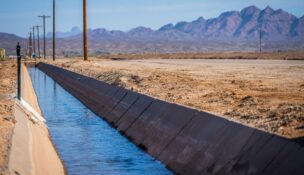Affordable housing: An issue yet unsolved
Jakob Thorington Arizona Capitol Times//July 18, 2025//
Key Points:
-
Lawmakers had ambitious goals for housing in 2025
-
Very little consequential legislation passed on the issue
-
Certain initiatives set to expire in 2026
Gov. Katie Hobbs outlined ambitious goals for Arizona’s housing policy during her State of the State Address in January, but some stakeholders think lawmakers punted those issues with little accomplishment.
Hobbs had a major win with Senate Bill 1611, the “Ag-to-Urban” bill that allows high-water users like farmers to convert their farms into lower density housing, a far less water intensive alternative. According to the governor’s office, the measure could result in the construction of up to tens of thousands of new homes and conserve nearly 10 million acre-feet of water.
The sponsor of the measure, Sen. T.J. Shope, R-Coolidge, called the new law the “most consequential piece of groundwater conservation legislation” since the 1980 Groundwater Management Act. Incidentally, the legislation could also have the dual effect of alleviating housing shortages by providing developers more leeway with water restrictions.
“Hard-working Arizonans will be able to pursue their American dream of homeownership as home supply increases in Maricopa and Pinal counties and prices naturally ease. Our farmers, who are ready to retire, can reap the benefits of their land while also allowing the state to save water,” Shope said in a news release after Hobbs signed the bill.
Several housing policy advocates still felt unsatisfied with the 57th legislative session after the state’s Low-Income Housing Tax Credit program didn’t receive new funding for an extension.
Hobbs called for a LIHTC extension in January, along with cutting “red tape that’s driving up” the cost of housing and a $15 million appropriation for the Housing Trust Fund, but lawmakers accomplished little on those goals.
A group of Republican and Democrat lawmakers formed a bipartisan housing caucus at the beginning of the session to work on the “Arizona Starter Homes Act,” Senate Bill 1229, and other housing issues.
The Starter Homes Act proposed targeted municipal regulations on the construction of new homes, but lawmakers were unable to reach an agreement with cities, which believed the issue overrode their zoning authority, and the measure never received a vote in the House.
The measure would have prohibited cities from requiring design features of homes like the inclusion of garages or specific amenities and floor plans. It called for minimum lot sizes of 3,000 square feet with the idea of allowing developers to build smaller homes with design features that homebuyers could afford.
This was the third consecutive year that a comprehensive zoning bill was introduced at the Legislature. Former Republican Sen. Steve Kaiser watched as his zoning reform bill failed in the Senate in 2023, and Hobbs vetoed the 2024 Starter Homes Act after it received heavy opposition from municipalities.
The League of Arizona Cities and Towns proposed its own Starter Homes Act bill in 2025 with Senate Bill 1698, but that measure wasn’t supported by legislators and failed to get a committee hearing.
All of this points to a complex issue being punted further and further down the road by legislators unable to reach a reasonable agreement with stakeholders.
“We had a responsibility this session to deliver on affordable housing, and we failed,” Sen. Analise Ortiz, D-Phoenix, said during her vote for the state budget.
The league’s bill would have limited starter homes to individuals or families with incomes below 120% of the area median income, and it would have limited occupancy for up to 15 years, while allowing cities to have more control over density in neighborhoods than SB1229 offered.
League officials argue these provisions guarantee homes are sold to Arizona residents instead of being bought by corporations which would then turn around and list the homes on the market at a higher price while maintaining local communities.
“Buying an affordable house is a legitimate challenge across Arizona,” said the League’s Executive Director Tom Belshe in a news release. “We are looking out for the needs of Arizonans and are asking legislators to ensure that hard-working residents are able to buy homes – not out-of-state investors and speculators.”
Although the major housing goals for the governor and other lawmakers were punted to 2026, Democrats celebrated some small housing wins.
Senate Minority Leader Priya Sundareshan, D-Tucson, noted in her budget vote that it includes $16.5 million for homelessness services such as eviction prevention and shelter operations for youth and families.
Hobbs’ Homes for Heroes initiative also got $2 million, and that program helps keep military veterans from being unhoused.
All of this equates to affordable housing remaining a key issue in 2026 for legislators looking to make the American dream a little more realistic for Arizonans.














































